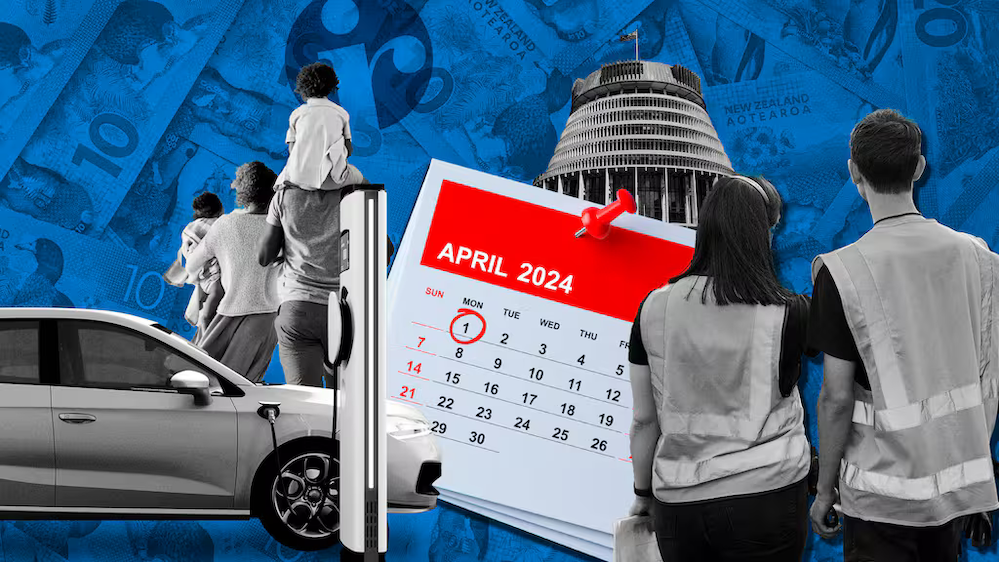𝕎𝕙𝕒𝕥 𝕥𝕙𝕖 𝔸𝕡𝕣𝕚𝕝 𝟙 𝕥𝕒𝕩 𝕒𝕟𝕕 𝕓𝕖𝕟𝕖𝕗𝕚𝕥 𝕔𝕙𝕒𝕟𝕘𝕖𝕤 𝕨𝕚𝕝𝕝 𝕞𝕖𝕒𝕟 𝕗𝕠𝕣 𝕪𝕠𝕦
𝕎𝕙𝕒𝕥 𝕥𝕙𝕖 𝔸𝕡𝕣𝕚𝕝 𝟙 𝕥𝕒𝕩 𝕒𝕟𝕕 𝕓𝕖𝕟𝕖𝕗𝕚𝕥 𝕔𝕙𝕒𝕟𝕘𝕖𝕤 𝕨𝕚𝕝𝕝 𝕞𝕖𝕒𝕟 𝕗𝕠𝕣 𝕪𝕠𝕦
𝔸 𝕟𝕖𝕨 𝕗𝕚𝕟𝕒𝕟𝕔𝕚𝕒𝕝 𝕪𝕖𝕒𝕣 𝕓𝕖𝕘𝕚𝕟𝕤 𝕠𝕟 𝕄𝕠𝕟𝕕𝕒𝕪 𝕒𝕟𝕕 𝕨𝕚𝕥𝕙 𝕚𝕥 𝕔𝕠𝕞𝕖𝕤 𝕥𝕙𝕖 𝕦𝕤𝕦𝕒𝕝 𝕤𝕝𝕖𝕨 𝕠𝕗 𝕘𝕚𝕧𝕖 𝕒𝕟𝕕 𝕥𝕒𝕜𝕖 𝕗𝕣𝕠𝕞 𝕥𝕙𝕖 𝕘𝕠𝕧𝕖𝕣𝕟𝕞𝕖𝕟𝕥.
H
A minimum wage increase
The adult minimum wage is increasing
by 2% on Monday – from $22.70 per hour to $23.15.The increase was revealed last month, with Workplace Relations and Safety Minister Brooke van Velden saying the Government wanted to strike a balance between “protecting the incomes of our lowest paid workers and maintaining labour market settings that encourage employment”.
Van Velden had initially proposed a 1.3% minimum wage increase, according to a Cabinet paper. The Ministry of Business, Innovation and Employment had recommended a 4% increase.
The training and starting-out minimum wages are still at 80% of the adult minimum wage so will also increase - from $18.16 to $18.52 per hour.
.

.
Benefit increases
Benefit rates also go up on April 1 as part of the Annual General Adjustment which takes place every year.
The Government pushed through legislation last month to change how those benefit increases are calculated.
The previous government indexed the main benefits to average wage growth. Now, those benefits will be indexed to the consumers price index (CPI).
Analysis by the NZ Herald
last year suggested that someone on the Jobseeker benefit would receive $50 a week less by 2030 if the government switched to CPI indexation.The Ministry of Social Development also noted that this switch would disproportionately affect women, Māori, Pasifika and disabled people if no other changes were made.
Social Development and Employment Minister Louise Upston defended the move in an interview with Q+A, saying indexing benefits to the CPI was “directly linked to the real costs that [beneficiaries] face”.
Meanwhile, Family Tax Credit rates will also increase
from April 1, with the income threshold for families receiving that credit lifting by around $1000.A full list of the new benefit rates is on the Work and Income website
.Interest deductibility returns for landlords

The first stage of bringing back mortgage interest deductibility on residential investment properties kicks in on April 1.
Landlords will be able to claim 80% of their interest expenses this financial year. They will then be able to claim 100% of those costs from April 2025.
The previous government had removed interest deductibility, but bringing it back was part of National’s coalition agreement with ACT.
The move represents a $2.9 billion tax break for landlords over the next four years.
Prime Minister Christopher Luxon said the policy would have “downward pressure” on rents because costs would be lower for landlords.
Several academics and economists have said it’s unlikely that people’s rents would decrease.
Road user charges for EVs and hybrids

People who drive light electric vehicles and plug-in hybrids will no longer be exemptfrom paying road user charges (RUC) from April 1.
Owners of light EVs will have to pay $76 per 1000km.
Drivers of plug-in petrol hybrid vehicles will pay $38 per 1000km (down from the original proposed rate of $53). This reduced rate is because hybrids also use petrol, which currently includes a fuel excise.
Transport Minister Simeon Brown said this change is the first step towards all drivers eventually paying a road user charge.
"This transition to RUC is about fairness and equity,” he said earlier this year. “It will ensure that all road users are contributing to the upkeep and maintenance of our roads, irrespective of the type of vehicle they choose to drive.”
The 'app tax' kicks in
Online marketplaces will need to collect and return GST on “listed services” from April 1.
Those services include short-stay accommodation, ride-sharing and food delivery. The GST obligation will apply even if the owner or driver of the services isn’t GST registered and makes less than $60,000 per year.
This has come to be known as the “app tax”.
National had campaigned on repealing the app tax if elected but backtracked on that promise after forming the coalition government. Finance Minister Nicola Willis said adjustments needed to be made after other sources of revenue were scuppered during coalition talks.

.
.
Changes still on the way for the trustee tax rate
The previous government had planned to raise the trustee tax rate from 33% to 39% from April 1.
This was to bring it in line with the top personal tax rate and stop people from using trusts to pay less tax.
However, a $10,000 trustee income threshold has since been proposed. This would mean trusts with no more than $10,000 of trustee income would still be taxed at the lower rate of 33%.
Trusts with income of more than $10,000 would be taxed at the new, higher rate.
The bill proposing those changes had its third reading in Parliament this week.






Comments
Post a Comment